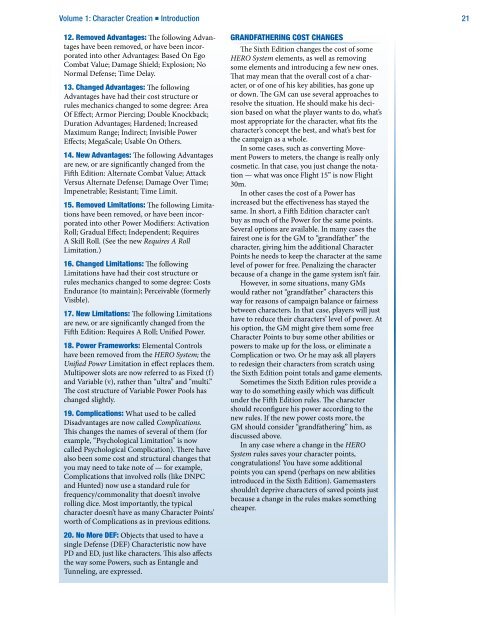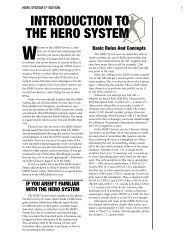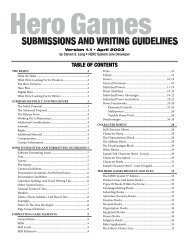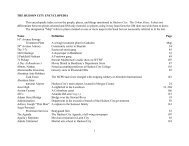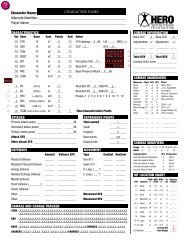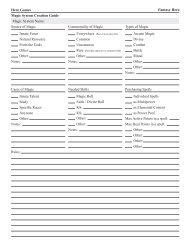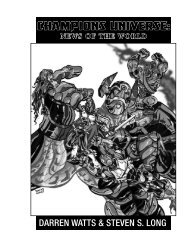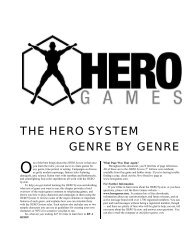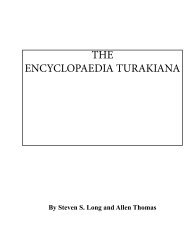converting characters to the sixth edition - HERO Games
converting characters to the sixth edition - HERO Games
converting characters to the sixth edition - HERO Games
Create successful ePaper yourself
Turn your PDF publications into a flip-book with our unique Google optimized e-Paper software.
Volume 1: Character Creation • Introduction 21<br />
12. Removed Advantages: The following Advantages<br />
have been removed, or have been incorporated<br />
in<strong>to</strong> o<strong>the</strong>r Advantages: Based On Ego<br />
Combat Value; Damage Shield; Explosion; No<br />
Normal Defense; Time Delay.<br />
13. Changed Advantages: The following<br />
Advantages have had <strong>the</strong>ir cost structure or<br />
rules mechanics changed <strong>to</strong> some degree: Area<br />
Of Effect; Armor Piercing; Double Knockback;<br />
Duration Advantages; Hardened; Increased<br />
Maximum Range; Indirect; Invisible Power<br />
Effects; MegaScale; Usable On O<strong>the</strong>rs.<br />
14. New Advantages: The following Advantages<br />
are new, or are significantly changed from <strong>the</strong><br />
Fifth Edition: Alternate Combat Value; Attack<br />
Versus Alternate Defense; Damage Over Time;<br />
Impenetrable; Resistant; Time Limit.<br />
15. Removed Limitations: The following Limitations<br />
have been removed, or have been incorporated<br />
in<strong>to</strong> o<strong>the</strong>r Power Modifiers: Activation<br />
Roll; Gradual Effect; Independent; Requires<br />
A Skill Roll. (See <strong>the</strong> new Requires A Roll<br />
Limitation.)<br />
16. Changed Limitations: The following<br />
Limitations have had <strong>the</strong>ir cost structure or<br />
rules mechanics changed <strong>to</strong> some degree: Costs<br />
Endurance (<strong>to</strong> maintain); Perceivable (formerly<br />
Visible).<br />
17. New Limitations: The following Limitations<br />
are new, or are significantly changed from <strong>the</strong><br />
Fifth Edition: Requires A Roll; Unified Power.<br />
18. Power Frameworks: Elemental Controls<br />
have been removed from <strong>the</strong> <strong>HERO</strong> System; <strong>the</strong><br />
Unified Power Limitation in effect replaces <strong>the</strong>m.<br />
Multipower slots are now referred <strong>to</strong> as Fixed (f)<br />
and Variable (v), ra<strong>the</strong>r than “ultra” and “multi.”<br />
The cost structure of Variable Power Pools has<br />
changed slightly.<br />
19. Complications: What used <strong>to</strong> be called<br />
Disadvantages are now called Complications.<br />
This changes <strong>the</strong> names of several of <strong>the</strong>m (for<br />
example, “Psychological Limitation” is now<br />
called Psychological Complication). There have<br />
also been some cost and structural changes that<br />
you may need <strong>to</strong> take note of — for example,<br />
Complications that involved rolls (like DNPC<br />
and Hunted) now use a standard rule for<br />
frequency/commonality that doesn’t involve<br />
rolling dice. Most importantly, <strong>the</strong> typical<br />
character doesn’t have as many Character Points’<br />
worth of Complications as in previous <strong>edition</strong>s.<br />
GRANDFATHERING COST CHANGES<br />
The Sixth Edition changes <strong>the</strong> cost of some<br />
<strong>HERO</strong> System elements, as well as removing<br />
some elements and introducing a few new ones.<br />
That may mean that <strong>the</strong> overall cost of a character,<br />
or of one of his key abilities, has gone up<br />
or down. The GM can use several approaches <strong>to</strong><br />
resolve <strong>the</strong> situation. He should make his decision<br />
based on what <strong>the</strong> player wants <strong>to</strong> do, what’s<br />
most appropriate for <strong>the</strong> character, what fits <strong>the</strong><br />
character’s concept <strong>the</strong> best, and what’s best for<br />
<strong>the</strong> campaign as a whole.<br />
In some cases, such as <strong>converting</strong> Movement<br />
Powers <strong>to</strong> meters, <strong>the</strong> change is really only<br />
cosmetic. In that case, you just change <strong>the</strong> notation<br />
— what was once Flight 15” is now Flight<br />
30m.<br />
In o<strong>the</strong>r cases <strong>the</strong> cost of a Power has<br />
increased but <strong>the</strong> effectiveness has stayed <strong>the</strong><br />
same. In short, a Fifth Edition character can’t<br />
buy as much of <strong>the</strong> Power for <strong>the</strong> same points.<br />
Several options are available. In many cases <strong>the</strong><br />
fairest one is for <strong>the</strong> GM <strong>to</strong> “grandfa<strong>the</strong>r” <strong>the</strong><br />
character, giving him <strong>the</strong> additional Character<br />
Points he needs <strong>to</strong> keep <strong>the</strong> character at <strong>the</strong> same<br />
level of power for free. Penalizing <strong>the</strong> character<br />
because of a change in <strong>the</strong> game system isn’t fair.<br />
However, in some situations, many GMs<br />
would ra<strong>the</strong>r not “grandfa<strong>the</strong>r” <strong>characters</strong> this<br />
way for reasons of campaign balance or fairness<br />
between <strong>characters</strong>. In that case, players will just<br />
have <strong>to</strong> reduce <strong>the</strong>ir <strong>characters</strong>’ level of power. At<br />
his option, <strong>the</strong> GM might give <strong>the</strong>m some free<br />
Character Points <strong>to</strong> buy some o<strong>the</strong>r abilities or<br />
powers <strong>to</strong> make up for <strong>the</strong> loss, or eliminate a<br />
Complication or two. Or he may ask all players<br />
<strong>to</strong> redesign <strong>the</strong>ir <strong>characters</strong> from scratch using<br />
<strong>the</strong> Sixth Edition point <strong>to</strong>tals and game elements.<br />
Sometimes <strong>the</strong> Sixth Edition rules provide a<br />
way <strong>to</strong> do something easily which was difficult<br />
under <strong>the</strong> Fifth Edition rules. The character<br />
should reconfigure his power according <strong>to</strong> <strong>the</strong><br />
new rules. If <strong>the</strong> new power costs more, <strong>the</strong><br />
GM should consider “grandfa<strong>the</strong>ring” him, as<br />
discussed above.<br />
In any case where a change in <strong>the</strong> <strong>HERO</strong><br />
System rules saves your character points,<br />
congratulations! You have some additional<br />
points you can spend (perhaps on new abilities<br />
introduced in <strong>the</strong> Sixth Edition). Gamemasters<br />
shouldn’t deprive <strong>characters</strong> of saved points just<br />
because a change in <strong>the</strong> rules makes something<br />
cheaper.<br />
20. No More DEF: Objects that used <strong>to</strong> have a<br />
single Defense (DEF) Characteristic now have<br />
PD and ED, just like <strong>characters</strong>. This also affects<br />
<strong>the</strong> way some Powers, such as Entangle and<br />
Tunneling, are expressed.


